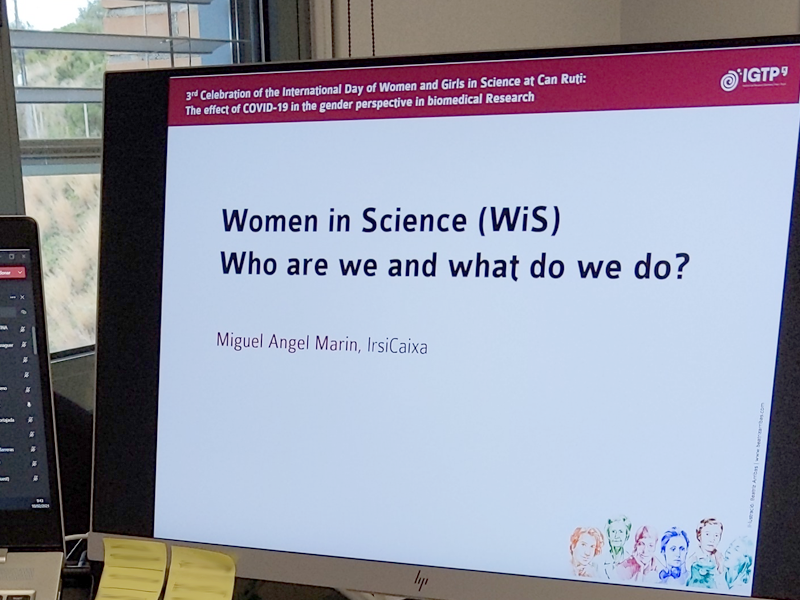Can Ruti focuses on the effect of COVID-19 in the gender perspective in biomedical research to celebrate the International Day of Women and Girls in Science

The 3rd Celebration of the International Day of Women and Girls in Science at Can Ruti took place on Wednesday 10 February, organized by the multi-institutional working group "Women in Science (WiS)", and hosted by the IGTP. The symposium looked at data on the gender perspective of the effects of the Covid-19 pandemic presenting data from studies both on and off the campus and providing a platform for personal testimonies from men and women involved in research and healthcare.
The meeting was opened by the Director of the Germans Trias i Pujol Research Institute, Jordi Barretina and Julia Garcia- Prado, Scientific Director of the IGTP and Principal Researcher at IrsiCaixa, who welcomed the 119 people attending. This year's event was completely online, due to Covid-19 restrictions and the 2-hour session had over 100 participants at all times.
Julia Garcia-Prado gave a round-up of the progress of the Equal Opportunities committees in the different institutions on the campus. Despite the pandemic, 2020 saw a lot of activity. IrsiCaixa, Fight AIDS Foundation and the IGTP all have official committees which are working on various aspects of their equal opportunities plans from drafting, or adapting to new legislation to training and guidelines. The Josep Carreras Leukaemia Institute and the Germans Trias Hospital are in the process of formalizing their committees.
For the IGTP, the Equal Opportunities Committee has undergone intensive training on writing gender equality plans (GEP) and is now working with the consultant on drafting. They have also administered the Gender Equality Audit and Monitoring questionnaire (GEAM), provided to them as members of the ACTonGender Project coordinated from the UAB. Of 336 people surveyed, 55% responded, an excellent result for a first questionnaire; the data, which will be presented to IGTP staff in 2021, is a vital part of the snapshot of the current situation to be incorporated into the IGTP GEP.
Miguel Angel Marin of IrsiCaixa introduced the members of the WiS committee and the brief film they produced about activities in 2019 as their entry in the gender perspective section of a Responsible Research and Innovation competition organized by the Instituto de Salud Carlos III. José A Muñoz-Moreno of the Fight AIDS Foundation highlighted two WiS activities in 2020. WiS continued its observatory of events organized on campus, only 50% of events fulfilled European criteria for a minimum of 40% women speakers, the same as for 2019, but the proportion with 20-40% has increased. He also presented the first results of the WiS Covid-19 Can Ruti Survey which clearly shows the different effects on men and women of the pandemic. This data will also be presented to the campus later this year.
Jordi Barretina presented a journal club on the paper Takahashi et al. Sex differences in immune responses that underlie COVID-19 disease outcomes (Nature 2020). This paper Suggests possible explanations for the observed sex biases in COVID-19 and provides an important basis for the development of a sex-based approach to the treatment and care of male and female patients with COVID-19.
Three invited short talks
Three invited speakers gave their points of view on gendered effects of the Covid-19 pandemic. Cristina Vilaplana of the Experimental Tuberculosis Unit at the IGTP showed results from a survey of 56,442 people in April 2020 on the Psychosocial impact of the COVID-19 pandemic: the COM-COVID Project. This is the largest survey carried out to date and identifies factors associated with higher mental health risk during the pandemic, mostly associated with gender. It highlights the necessity of implementing interventions for target groups to increase people's resilience facing this and future health emergencies.
Roni Wright of the CRG gave a personal view of how the pandemic had affected her as a researcher and mother and outlined what measures the Centre for Genomic Regulation had taken. She gave her own practical tips for parents struggling to combine home-working, home-schooling and laboratory work.
Jordi Puig, Study Coordinator of the Fight AIDS Foundation (FLSIDA) and nurse at the Germans Trias Hospital gave a personal view as a member of healthcare staff on the frontline. He explained his own experience and his view of the gender impact of epidemics and raised the important issue of missing women in research data.
WiS engaging with the campus
A Can Ruti Women in Science Symposium would not be the same without an interactive session with the audience and this was no exception. Marta Monguió of the Germans Trias Hospital and the IGTP ran a lively session where the audience raised their hands to reply and the short talk speakers added their comments. This session continued a dynamic exchange in the meeting chat between speakers, organizers and the audience.
The meeting was rounded off with a summing up by Cristina Agustí of the CEEISCAT, followed by a homage to June Almeida and Katalina Karikó, by Nuria Izquierdo-Useros of IrsiCaixa. These two pioneering researchers into coronavirus biology made major contributions to the current understanding of the virus and the RNA vaccine technology. Despite the relevance of the SARS-CoV-2 virus to us today, neither of their names are well-known; the Can Ruti WiS would like to make a small contribution to correcting this.
The Women in Science Group on Can Ruti Campus currently has 13 members and is open to more. You can contact them on WisCanRuti(ELIMINAR)@gmail.com.
